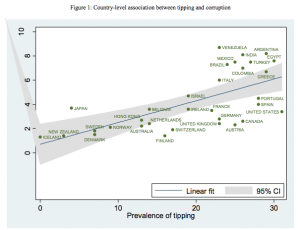Returning to US after having been abroad for six months required me to retrain my mind in a number of different ways regarding social norms. One of the main things I noticed while traveling was that tips are not a mandatory part of eating out, and were sometimes even seen as rude. They serve more as a signal to the waiter to convey out of the ordinary, outstanding service.
This made me think about how in America the price that is advertised to us is often never the price we pay, while in most parts of Europe taxes are incorporated into the price and tipping isn’t mandatory everywhere. We also see a lack of transparency in our wages, while in places like the Netherlands, salaries are quoted after tax deductions.
But banning tips comes at a cost to the customer, which entails raising menu item prices and paying the waiters a higher set wage. There are pros and cons to this solution as it is similar to the method of incorporating taxes into store items, and may result in a decline in outstanding customer service, and slower table turnover.
Magnus Torfason from the Harvard Business School said, “the more tipping you see in a given country, the more corruption you generally see in that country as well”.
Many people believe that high tips are the main factor in the production of hard work. But studies have shown that the factors that most strongly correlate to high tips don’t have very much to do with the quality of service.
For example credit card tips are most often larger than cash tips, and larger parties leave fractionally smaller tips. We also tip servers more if they touch us on the arm, draw a smiley face on our check, or introduce themselves by name. These factors have very little to do with the actual service. There have also been studies conducted about the significant tipping gaps between African-American and white customers, which causes for waiters to prioritize certain customers.
The problem we see isn’t as much on the tippers side and more on the restaurant’s side, as federal “tip credit” lets restaurants get away with paying their tipped workers as low as $2.13 per hour, as long as tips compensate the difference. But tip credit doesn’t exist in all states, such as California and Washington, which complicates things for chains that operate across the country.
It would be very difficult to reverse something like tipping, which has become such a part of our society. But the question of banning tipping isn’t a question of saving consumers a significant amount of money, since menu items will rise. This dilemma is more a question of what fiscal components of our economy do we want to be more transparent, and if tipping was banned, how will we reward great workers?

